高二英语同步学案第14讲选修6unit2上
module6unit2reading学案(教师版)(译林牛津版高二英语选修六学案设计)

module6 unit 2 reading 学案(教师版)(译林牛津版高二英语选修六学案设计)Module6 uint2 What is happiness to you------reading language pointsI language points1. goal1)目的,目标achieve/reach/realize one’s goal实现目标;2)(球戏等的)得分,赢分 make/score/get a goal 得一分2. times 时代;时势;境况(常用复);the times 当代The times are different. 时代不同了。
in modern/ancient times 在近(古)代What wonderful times we are now living in!我们生活的时代是多么幸福的啊!This is one of the most important issues of the time.这是当代最重大的问题之一。
3. apart1)(指空间或时间)相隔,相距The two houses stood 500 meters apart.Their birthdays are only three days apart.2)不在一起;分离;分开We’re living apart now.She keeps herself apart from other people4. devote…to… v 献身…的;专心于…的;专用于…的;devote oneself to 献身于;致力于She devoted herself to fighting for therights for the blacks.她致力于为黑人权利而战的事业中。
Don’t devote too much time to games.不要过度沉溺于游戏。
devoted adj 挚爱的;忠诚的;全心全意的She devoted herself to her children. = She was devoted to her children.5.cost 使丧失;使损失That one mistake almost cost him his life.The closure of the factory will cost 1,000 jobs.The accident cost me a visit to the doctor.Financial worries cost her many sleepless nights.她为钱发愁,许多夜晚无法入睡。
英语译林牛津选修6Module2同步导学案Task

英语译林牛津版选修6Module2同步导学案(Task)M6U2 What is happiness to you?---- Task导学案【学习目标】1.To learn and practice language skills of listening, speaking, reading and writing.2.Enable students to identify negative emotional language.3.Learn to break a big question into smaller ones to discuss and give advice to solve problems. Write an article about how to help others solve their problems【学习重点】1. Find and underline the main ideas.2. Find and circle the key words.3. Give advice to solve problems【学习难点】(1). Find and underline the main ideas.(2). Find and circle the key words.【学习方法】1.课前预习Task部分单词,找出不会读的单词,记住单词的汉语意思。
2.通过阅读,了解解决问题的关键词和主题。
【复习巩固】回归本单元的语法讲解和习题【预习检测】1.请同学们课前预习Task部分单词,找出不会读的单词,记住单词的汉语意思。
2.Read passage on page 26 and underline the words, phrases and structures which are negative. Answer the question: What problem does Ma Jie have?Underline the words, phrases and structures【课堂教学】1.检查预习情况,提出自己不会读的单词,在老师的帮助下,解决单词的读音问题。
高二英语译林版选修6教案:Unit2(task)含解析
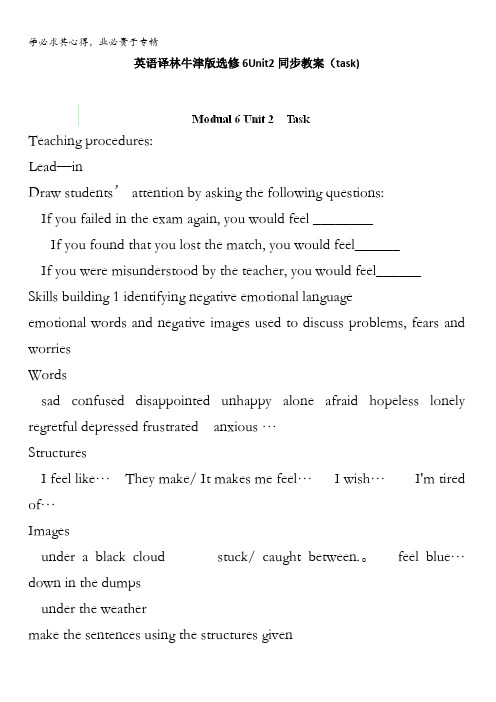
英语译林牛津版选修6Unit2同步教案(task)Teaching procedures:Lead—inDraw students’ attention by asking the following questions:If you failed in the exam again, you would feel ________If you found that you lost the match, you would feel______If you were misunderstood by the teacher, you would feel______Skills building 1 identifying negative emotional languageemotional words and negative images used to discuss problems, fears and worriesWordssad confused disappointed unhappy alone afraid hopeless lonely regretful depressed frustrated anxious …StructuresI feel like…They make/ It makes me feel…I wish…I'm tired of…Imagesunder a black cloud stuck/ caught between.。
feel blue…down in the dumpsunder the weathermake the sentences using the structures givenI felt like crying when I knew I would never see my grandma again. Failing my Maths test again made me feel rather depressed。
高二英语选修6教案(精编版)Unit 2 Period 2

Unit 2 PoemsPart 1 Teaching Design第一部分教学设计Period 2 A sample lesson plan for Learning about Language (Subjunctive Mood (2) If I had done…, I would havedone…)IntroductionIn this period students will be warming up by discovering, studying Subjunctive Mood (2) If I had done…, I would have done…, doing vocabulary exercises, doing grammar exercises and closing down the lesson by summing up how to enjoy a poem.Objectives■To help students learn about Subjunctive Mood If I had done…, I would have done…■To help students discover and learn to use some useful words and expressions Procedures1. Warming up by discoveringTurn to page 1 and page 10. Read the two texts again to find examples containing structures like If I had done…, I would have done…On page2: If the rules of perspective had not been discovered, people would not have been able to paint such realistic pictures.On page10: We would have won, if we had trained harder.2. Studying Subjunctive Mood (2) If I had done…, I would have done…First look at the following example and study the blackened part.Are you a candidate for prime ministership?If I had wanted to be Prime Minister, I would have become PM in 1991. That is not the reason I came into politics. It was for the revival of the Congress party. That is supremely important to me.I have said that my priority is to see to it, with other like-minded parties, that we defeat the present dispensation.Subjunctive Mood: How to form tensesThe subjunctive mood is used to express a wish, hope, uncertainly or other like feeling about a fact or an idea. In contemporary English it is seldom used. We see it in 3 forms:▼contrary to fact statements: If I were you, I would not see that movie.(were not was)▼following verbs of asking, demanding and recommending: I asked that she come at 6 pm. (not comes)▼forms of "to be": Let it be! So be it!3.Looking back4. Doing vocabulary exercisesTurn to page12 and deal with Ex.1 &2 to discover useful words and expressions. 5.Doing grammar exercisesTurn to page 13 and deal with grammar exercise 1 to 4 to discover useful structures.6. Closing down by summing up how to enjoy a poemAs you listen to and read poetry, try to see and hear immediately that a poem:★can be about anything★can use few words★has a unique form and shape★may or may not have rhythm and a beat★often ends with a punch★has a title★may use invented spelling★is easy to create★may be serious or humorous★u sually expresses important personal feelings。
(完整版)人教版选修6Unit2教案
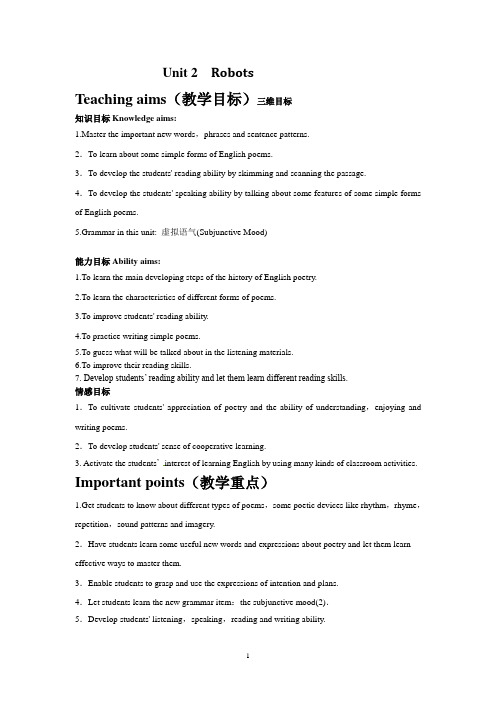
Unit 2 RobotsTeaching aims(教学目标)三维目标知识目标Knowledge aims:1.Master the important new words,phrases and sentence patterns.2.To learn about some simple forms of English poems.3.To develop the students' reading ability by skimming and scanning the passage.4.To develop the students' speaking ability by talking about some features of some simple forms of English poems.5.Grammar in this unit: 虚拟语气(Subjunctive Mood)能力目标Ability aims:1.To learn the main developing steps of the history of English poetry.2.To learn the characteristics of different forms of poems.3.To improve students' reading ability.4.To practice writing simple poems.5.To guess what will be talked about in the listening materials.6.To improve their reading skills.7. Develop students’ reading ability and let them learn different reading skills.情感目标1.To cultivate students' appreciation of poetry and the ability of understanding,enjoying and writing poems.2.To develop students' sense of cooperative learning.3. Activate the students’interest of learning English by using many kinds of classroom activities. Important points(教学重点)1.Get students to know about different types of poems,some poetic devices like rhythm,rhyme,repetition,sound patterns and imagery.2.Have students learn some useful new words and expressions about poetry and let them learn effective ways to master them.3.Enable students to grasp and use the expressions of intention and plans.4.Let students learn the new grammar item:the subjunctive mood(2).5.Develop students' listening,speaking,reading and writing ability.Difficult points(教学难点)1.Enable students to master the use of the subjunctive mood.2.Let students learn to create their own poems.3.Develop students' integrative skillsTeaching methods(教学方法)1. Task-based teaching and learning2. Cooperative learning and practice3.Asking-and-answering activity to check the students’ answers of the exercises;individual,pair or group work to finish each task.4. Fast and careful reading.5. Discussion.Teaching aids(教具)(1)a tape recorder(2)a projector(3)the blackboard、whiteboard and other normal teaching tools学法指导合作探究对话推理教材分析本单元的中心话题是诗歌。
英语选修6学案Unit2(book6)
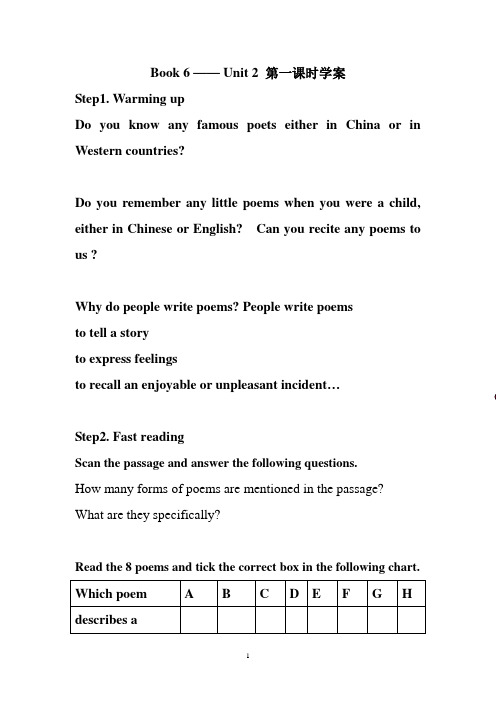
Book 6 —— Unit 2 第一课时学案Step1. Warming upDo you know any famous poets either in China or in Western countries?Do you remember any little poems when you were a child, either in Chinese or English? Can you recite any poems to us ?Why do people write poems? People write poemsto tell a storyto express feelingsto recall an enjoyable or unpleasant incident…Step2. Fast readingScan the passage and answer the following questions.How many forms of poems are mentioned in the passage? What are they specifically?Read the 8 poems and tick the correct box in the following chart. Which poem A B C D E F G H describes aperson?tells a story?describes anaspect of aseason?is about sport?is about thingsthat don’t makesense?describes a riverscene?has rhymingwords at the endof lines?repeats wordsand phrases?Step 3 Careful readingNow let’s listen to the introductions of the following 8 poems and finish tasks.Listen to Poem A and pay attention to its rhyming lines and words, and then think about the following questions.1.What does poem A mainly talk about?Then, listen to poem B and C and answer the following Qs2. What does poem B and poem C mainly talk about?3. Did his or her team win the game?4. Why his or her team didn’t win the game?5. Does the speaker really believe his or her own excuse? How do you know?Poem D&E7. W hat’re Poems D and E about? Do the authors like the subjects of the two poems? Give reasons for your answer.8. What do poem F and G talk about?Now, listen to the Poem H from Tang dynasty9. What is the story that the poem tells? Tell the story in your own words.10. Underline one or more of the feelings below that you think the woman has. Give reasons for your answers: loneliness joy love trust anger hate sorrowStep 4 Summary and DiscussionAfter enjoying these five types of poem, can you tell me the their features?featuresForms ofpoemsNurseryrhymes(A)List poems (Band C)Cinquain (Dand E)Haiku(F and G)Tang poems(H)Discussing in groups: Are poems good for our life? What can we get from poems?Step 5 Homework1. Review the text and pay attention to some key words, phrases, and sentences.2. Surf the internet to appreciate and recite more English poems.。
高二英语牛津版选修6unit2reading教案
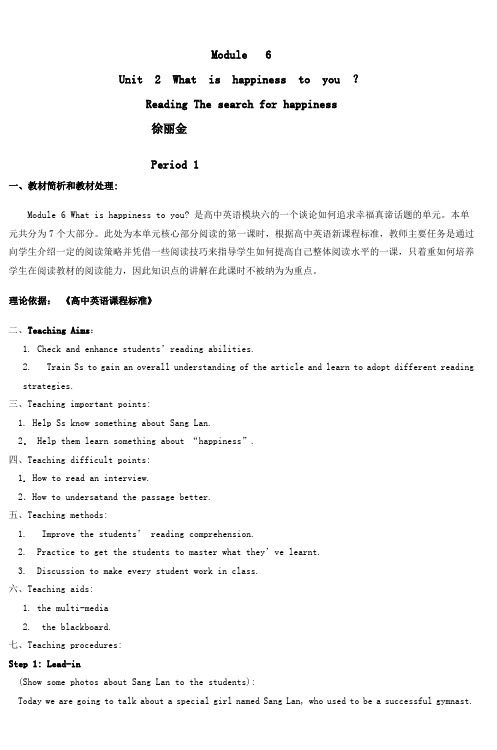
Module 6Unit 2 What is happiness to you ?Reading The search for happiness徐丽金Period 1一、教材简析和教材处理:Module 6 What is happiness to you? 是高中英语模块六的一个谈论如何追求幸福真谛话题的单元。
本单元共分为7个大部分。
此处为本单元核心部分阅读的第一课时,根据高中英语新课程标准,教师主要任务是通过向学生介绍一定的阅读策略并凭借一些阅读技巧来指导学生如何提高自己整体阅读水平的一课,只着重如何培养学生在阅读教材的阅读能力,因此知识点的讲解在此课时不被纳为为重点。
理论依据:《高中英语课程标准》二、Teaching Aims:1.Check and enhance students’reading abilities.2. Train Ss to gain an overall understanding of the article and learn to adopt different readingstrategies.三、Teaching important points:1.Help Ss know something about Sang Lan.2.Help them learn something about “happiness”.四、Teaching difficult points:1. How to read an interview.2.How to undersatand the passage better.五、Teaching methods:1. Improve the students’ reading comprehension.2. Practice to get the students to master what they’ve learnt.3. Discussion to make every student work in class.六、Teaching aids:1. the multi-media2. the blackboard.七、Teaching procedures:Step 1: Lead-in(Show some photos about Sang Lan to the students):Today we are going to talk about a special girl named Sang Lan, who used to be a successful gymnast.What do you know about this girl?Now let’s think about Sang Lan’s experience: Do you think Sang Lan had had a happy life before she was injured? Do you think Sang Lan has a happy life now? What would you do if you had the same problem? Suppose you had a chance to talk face to face with Sang Lan, what would you like most to ask her about?【设计说明】通过看图片和谈论,让学生走近桑兰,把学生很自然地引入到新课中,同时激发了他们学习课文内容的浓厚兴趣。
高中英语(新课程标准)选修6全单元教案Unit2
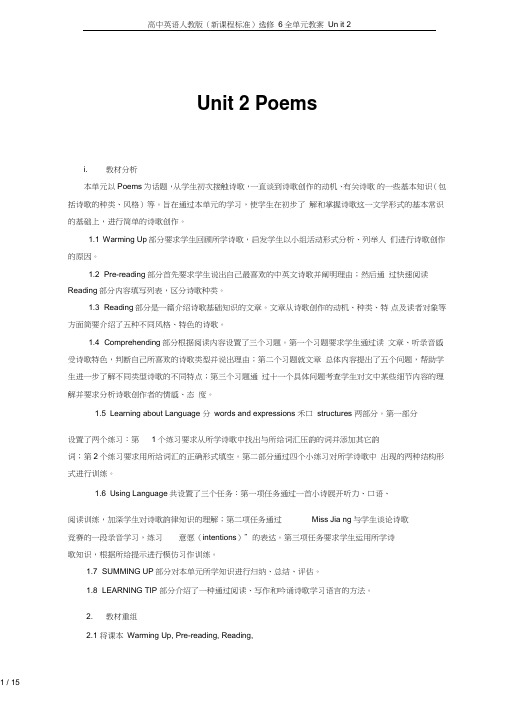
Unit 2 Poemsi. 教材分析本单元以Poems为话题,从学生初次接触诗歌,一直谈到诗歌创作的动机、有关诗歌的一些基本知识(包括诗歌的种类、风格)等。
旨在通过本单元的学习,使学生在初步了解和掌握诗歌这一文学形式的基本常识的基础上,进行简单的诗歌创作。
1.1 Warming Up部分要求学生回顾所学诗歌,启发学生以小组活动形式分析、列举人们进行诗歌创作的原因。
1.2 Pre-reading部分首先要求学生说出自己最喜欢的中英文诗歌并阐明理由;然后通过快速阅读Reading部分内容填写列表,区分诗歌种类。
1.3 Reading部分是一篇介绍诗歌基础知识的文章。
文章从诗歌创作的动机、种类、特点及读者对象等方面简要介绍了五种不同风格、特色的诗歌。
1.4 Comprehending部分根据阅读内容设置了三个习题。
第一个习题要求学生通过读文章、听录音感受诗歌特色,判断自己所喜欢的诗歌类型并说出理由;第二个习题就文章总体内容提出了五个问题,帮助学生进一步了解不同类型诗歌的不同特点;第三个习题通过十一个具体问题考查学生对文中某些细节内容的理解并要求分析诗歌创作者的情感、态度。
1.5 Learning about Language 分words and expressions 禾口structures 两部分。
第一部分设置了两个练习:第1个练习要求从所学诗歌中找出与所给词汇压韵的词并添加其它韵词;第2个练习要求用所给词汇的正确形式填空。
第二部分通过四个小练习对所学诗歌中出现的两种结构形式进行训练。
1.6 Using Language共设置了三个任务:第一项任务通过一首小诗展开听力、口语、阅读训练,加深学生对诗歌韵律知识的理解;第二项任务通过Miss Jia ng与学生谈论诗歌竞赛的一段录音学习,练习意愿(intentions)”的表达。
第三项任务要求学生运用所学诗歌知识,根据所给提示进行模仿习作训练。
1.7 SUMMING UP部分对本单元所学知识进行归纳、总结、评估。
- 1、下载文档前请自行甄别文档内容的完整性,平台不提供额外的编辑、内容补充、找答案等附加服务。
- 2、"仅部分预览"的文档,不可在线预览部分如存在完整性等问题,可反馈申请退款(可完整预览的文档不适用该条件!)。
- 3、如文档侵犯您的权益,请联系客服反馈,我们会尽快为您处理(人工客服工作时间:9:00-18:30)。
广州卓越教育机构一对一高二英语同步学案(1期)第十四讲【上半讲unit 2,Book 6(上)】一.入门一测(Quiz)(一)用所给词的适当形式填空1.I don’t have much money. If I _______________(do), I _________________(buy) a house of my own.2.I wish I ________________(can) fly one day.3.It is requested that Professor Li ______________(give) us a speech.4.Mother has ordered that no one ______________(leave) the house without her permission.5.--I would rather that you ________________(tell) him my secret.--I’m really sorry.(二)完成句子6.这个英语晚会的主要目的是要为学生提供用英语交流的平台。
The __________ aim of the English evening is _________________(provide) a platform for the students to communicate in English.7.我坚信只有共同努力我们才能建设和谐社会。
I am fully ________________ that only with combined efforts _______ _________ build a harmonious society.8.科技是第一生产力。
______________ and _______________ is primary productive force.9.那天我碰巧忘记带雨伞。
That day, I forgot to bring my umbrella ___________ ____________.10.要获得幸福,我们应当积极面对生活中的各种艰难。
To get happiness, we are supposed to __________ a positive ___________ ________.二.词汇银行(V ocabulary Bank)(二)用括号内所给的词的适当形式填空。
1.As a _____________, he often made wrong ____________ though he tried his best to ________________ everything.(predict)2.You can’t give the registered letter to him unless you see his _______________, so ask him to ________________ on it first.(sign)3.I have ________________ in him because he has served us ________________ for many years, and I think he is a ________________ and honest friend.(faith)4.I was walking __________________ on the street when I came across John, who led an ___________ sort of life without any ______________.(aim)5.In the coming month, the academy will ______________ several prints which are rarely seen in our city. It is said that those prints will be on _________________ until the end of the month.(exhibition)6.As a rich businessman, he was thought to ______________ a great deal of ______________.(possess)7.After they settled _______________ in the States, they wanted to look for _______________ jobs.(permanent)三.互动火花(Teaching & Learning)【知识点击】1.... that is, the painter does not attempt to paint objects as we see them with our eyes...那就是说,画家不再试图按照我们肉眼所见的方式绘画物体。
attempt v./n. -----to make an effort at ...; try; 努力,尝试,企图观察下列例句,归纳attempt 的用法:The prisoners attempted to escape but failed.= The prisoners attempted an escape but failed.【搭配】attempt to do sth./ attempt at doing sth. 尝试做某事,企图做某事=make an attempt to do sth.make no attempt 未尝试at the / one’s first attempt 第一次尝试完成句子:(1)他试图行走直到摔倒。
He _________________________ until he fell over.(2)他参加过考试,可是失败了。
He_______________________ but failed.(3)我企图说话,可是有人要我安静点。
I ___________________ but was told to be quiet.2.“有”所差别——possess/ own/have 辨识【一言辨异】possess较为正式,强调对目前拥有或占有的东西可以控制或支配。
也用于表示具有某种才能,品质,特点或性能的等。
own: 强调所属关系;have:常用词,可指任何情况下的具有,包括物质的或精神的。
(1)We will __________ a dinner party tomorrow evening.(2)She ___________ herself of the unclaimed (无人认领的)goods.(3)Daisy ____________ a chain of restaurants though still young.(4)We all like to attend Professor Zhang’s lecture because he _____________great tact(机智).四.升级必备(Up-grading Practice)(一)单词拼写1.With the advancement of the society, there are no ____________(永久的) jobs any more.2.What the child painted was thought to be _____________(可笑的)3.He _____________(企图) to escape being punished.4.The _____________(有争议的) book hasn’t come out yet.5.Sometimes moral values (道德价值观) are ______________(抽象的).6.All the _______________(财产) belong to the country.7.________________(当代的) buildings are of different styles.8.It is ______________(典型的) of her to be late.9.He _______________(瞄准) the gun at the enemy officer.10.Under no circumstance shall we lose _______________(信念) in the future.(二)重点句子模仿翻译1.On (the) one hand, some modern art is abstract; that is, the painter does not attempt to paint objects as we see them with our eyes, but instead concentrates on certain qualities of the object, using colour, line and shape to represent them. On the other hand, some paintings of modern art are so realistic that they look like photographs.(PP.3-52) 一方面,有些现代艺术是抽象的,也就是说,画家并不打算把我们眼睛看到的东西如实地画出来,而是集中展现物体的某些品质特性,用色彩、线条和形状把他们呈现出来。
而另一方面,有些现代派的艺术作品确是那么的真实,看上去就像是照片。
【模仿】他决定辞职。
一方面因为他厌倦了目前的工作,而另一方面他想换一个地方。
(on the one hand, on the other hand)2.这部电影对年轻人很有吸引力。
(appeal to)3.But it was evident that ideas were changing in the 13th century when painters like Giotto di Bondone began to paint religious scenes in a more realistic way.(PP.2-10)但是,很显然到了13世纪时,观念发生变化,像乔托这样的画家开始以一种比较现实的风格来画宗教场景。
